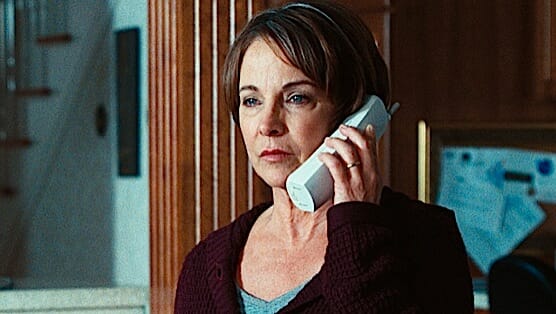
American tragedy serves as underfed underpinning for rote family commotion and theatrics in After, a resoundingly unpersuasive ensemble drama that focuses on an extended working-class clan who seem to all be walking on eggshells around one another. Very proud of the air-quote mystery whose eventual revelation becomes apparent roughly 20 minutes into proceedings, director Pieter Gaspersz’s film settles into a self-serious glide-path of inanity early on, never to recover.
After unfolds in upstate New York in the chilly, autumnal months of late 2002, where gruff patriarch Mitch Valentino (John Doman) lives with his wife Nora (Kathleen Quinlan), surrounded by their children. One of their sons, Chris (Pablo Schreiber), has taken over the family contracting and stonemasonry business, which has fallen on hard times; another, Nicky (Adam Scarimbolo), works as a tattoo artist and exists as a caricature of diminutive chest-puffery. Daughter Maxine (screenwriter Sabrina Gennarino) works as a bartender and is locked in a four-year relationship with Andrew (Darrin Dewitt Henson), while Kat (Diane Neal) is a habitually underemployed slacker for whom anyone seems unable to use the word “alcoholic,” even though they chide her about her drinking. The sole Valentino sibling who has seemingly escaped this blue-collar roundelay of exasperation and unhappiness is Samantha (Alexi Maggio), of whom the family gathers to watch occasional videotape updates made by she and her boyfriend. An already precarious collective emotional truce is thrown into disarray when Maxine and Andrew announce their wedding, of which Mitch does not approve.
In its log line, After bills itself as “a searing story of denial, deception and self-delusion,” but those descriptors might best apply to the shared mental state of the film’s makers. The drama here just doesn’t track or connect, at all. Ostensibly, After rests on the shoulders of the Academy Award-nominated Quinlan. And in a best-case scenario, the movie would find to-scale redemption as a showcase for her talents. But Gennarino and Gaspersz give her absolutely nothing of substance to inform Nora’s fragility, leaving Quinlan the difficult task of trying to navigate the chasm between her character’s blithe, make-nice disposition and a couple of complete breakdowns.
The script is at the core of all the movie’s problems; it’s at once self-satisfied and oddly vague. It’s as if Gennarino thought that her “hook” would do all the heavy story lifting, and characterizations would take care of themselves. Some of the movie could in theory still work, as a portrait of stuck-in-a-rut familial despair. But as mentioned, the screenplay is just too thin, powered by wan economic troubles and other ill-defined acting out. And even if somehow viewers don’t catch on early to the central lie informing everyone’s behavior (a dubious proposition), in the end After never asserts any particular reason for its contrived narrative construct, which renders the film somewhere between sexist and just plain stupid.
Gaspersz’s staging is boxy and unengaging, and below-the-line artisans do little to add to or elevate the emotional connection of this offering; cinematographer Jonathan Hall’s compositions are flat, Jeff Beal’s music is unmemorable and Bill Mancuso’s art direction is drab and unconvincingly spare throughout. Quinlan is an under-appreciated actress, but After isn’t the movie to remind audiences of her talents.
Director: Pieter Gaspersz
Writer: Sabrina Gennarino
Starring: John Doman, Kathleen Quinlan, Pablo Schreiber, Adam Scarimbolo, Sabrina Gennarino, Diane Neal, Darrin Dewitt Henson, Bruno Gunn, Mandy Gonzalez
Release Date: Aug. 8, 2014
Brent Simon is a regular contributor to Screen Daily, Paste, Magill’s Cinema Annual and Playboy, among many other outlets, as well as a member and former three-term president of the Los Angeles Film Critics Association. You can follow him on Twitter and on his blog.